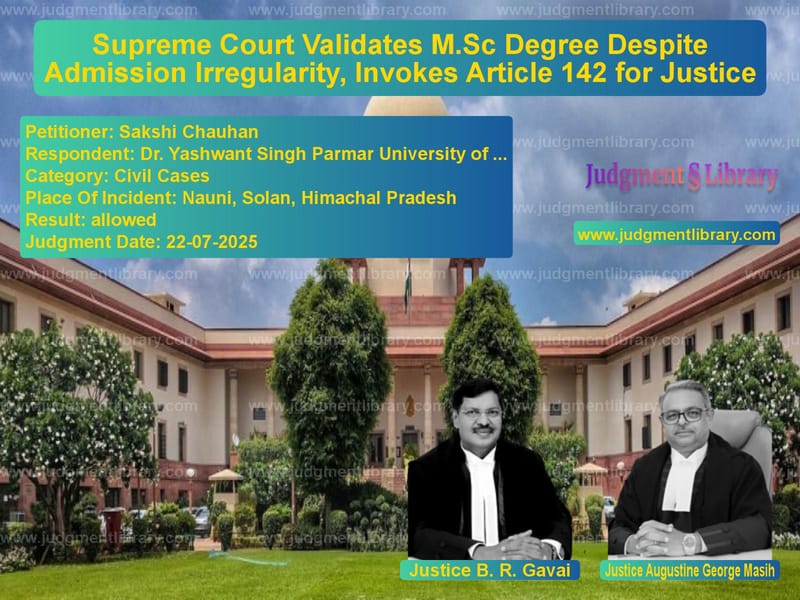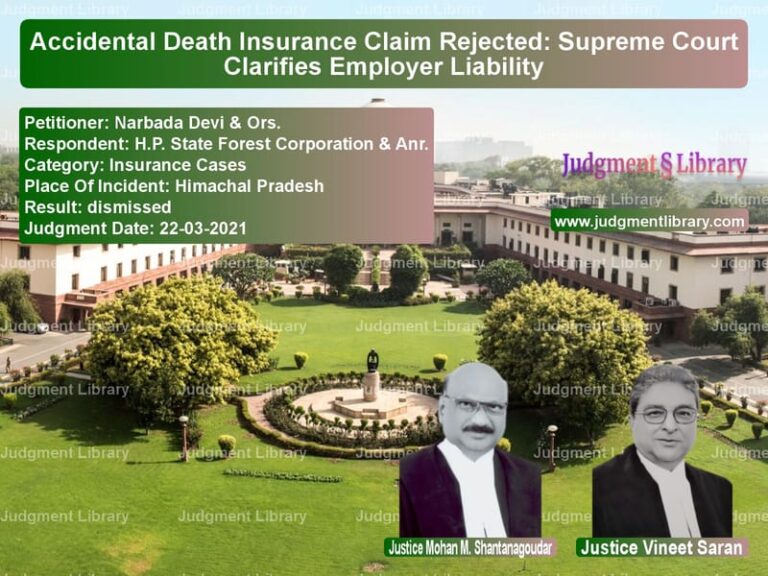Supreme Court Validates M.Sc Degree Despite Admission Irregularity, Invokes Article 142 for Justice
In a significant ruling that balances institutional autonomy with individual justice, the Supreme Court has restored a postgraduate degree to a student who completed her entire M.Sc program despite initial admission irregularities. The case of Sakshi Chauhan versus Dr. Yashwant Singh Parmar University of Horticulture & Forestry represents a classic conflict between procedural technicalities and substantive justice, where the court ultimately chose to protect a student’s two years of academic effort from being nullified due to administrative confusion.
The story begins in May 2020 when Sakshi Chauhan applied for admission to the M.Sc/MBA (Agri Business Programme) at Dr. Yashwant Singh Parmar University in Nauni, Solan, Himachal Pradesh. She had completed her Bachelor of Science (Hons.) in Agriculture from Eternal University, Baru Sahib, Sirmour – a private university recognized by the University Grants Commission (UGC). The original prospectus issued by the university in May 2020 seemed to indicate that she was eligible, as it required candidates to have passed B.Sc from a UGC-recognized university, which she had.
However, the COVID-19 pandemic disrupted the normal admission process. The entrance test scheduled for June 2020 was cancelled, and the university decided to prepare a merit list based on candidates’ Overall Grade Point Average (OGPA) from their qualifying degree. This is where the confusion began. The university started issuing multiple addendums and notices changing the eligibility criteria.
On December 3, 2020, the university issued a notice stating that candidates who had passed their B.Sc degree from non-State Agricultural Universities/Central Agriculture Universities/Central Universities with Agriculture faculty were not eligible. Then on December 11, 2020, an addendum amended Chapter 3 of the Prospectus, stating that candidates from private agricultural universities/colleges not accredited by the Indian Council of Agricultural Research (ICAR) were ineligible, even if affiliated to public funded institutions. Another addendum followed on December 15, 2020, further clarifying the exclusion.
Based on these changing criteria, the university prepared two lists – one for eligible candidates and another for ineligible ones. Since Sakshi had passed her B.Sc Agriculture from a private university not falling under SAUs/CAUs/CUs, she was declared ineligible and her candidature was rejected.
The Legal Battle Begins
Sakshi Chauhan approached the Himachal Pradesh High Court challenging the changing eligibility criteria and the rejection of her candidature. The court initially passed an interim order on January 27, 2021, directing the university to permit her to participate in counseling, with the clarification that this participation wouldn’t create any rights. Eventually, she was granted admission to M.Sc Environmental Management against a self-finance seat, which she accepted.
The Single Judge of the High Court ultimately dismissed her petition on March 6, 2021, holding that she was indeed ineligible for admission. However, she filed an intra-court appeal, and the Division Bench stayed the Single Judge’s judgment. On April 19, 2021, the court directed the university to permit Sakshi to continue her studies provisionally.
This provisional admission proved crucial. Sakshi continued her studies, completed the entire course curriculum, fulfilled all attendance requirements, and performed well in her examinations. She was awarded the M.Sc degree on May 4, 2023. However, the Division Bench ultimately dismissed her appeal on July 19, 2023, upholding the Single Judge’s view that she was ineligible. The university then withdrew her degree through a notification dated August 5, 2023, leading to the present appeal before the Supreme Court.
The Arguments Before the Supreme Court
Sakshi’s counsel made compelling arguments before the Supreme Court. He pointed to “the above factual aspects and the manner in which the eligibility criteria at initial stage followed by clarifications/changes/addendums submitted that it led to a lot of confusion and uncertainty in the process of admission.” He argued that “Had the Prospectus been clear, the application of the Appellant as submitted in May 2020, should have been, at the very outset, rejected.”
The counsel emphasized the practical consequences: “This exercise, if carried out in time, would have enabled the Appellant to seek admission in other institutions. Firstly, the Appellant was banking upon the competitive examination for admission to be held in the month of June 2020, and thereafter, on a decision being taken for admission to be based on the merit obtained in the graduation degree, the said process was also delayed extraordinarily by the issuance of the various addendums etc. as mentioned above.”
His most powerful argument was that “once the admission had been granted and the Appellant had completed her course and that too successfully, leading to the issuance of postgraduate degree, the cancellation thereof, vide notification dated 05.08.2023, and withdrawal of the same by Respondent No. 1, University, is unsustainable.”
On the specific eligibility issue, he noted that “it was not apparent that a candidate from a private university would not be eligible for admission to the postgraduate course. According to the minimum qualification/eligibility clause as contained in the Prospectus, a candidate who had passed B.Sc from a UGC-recognized university was eligible for admission, which the Appellant possessed.”
The university’s counsel, however, supported the High Court’s judgments, arguing that “the eligibility of the Appellant, if seen as per the original Prospectus criteria, would render her ineligible, and therefore the subsequent changes, if any, in the eligibility criteria did not affect the candidature of the Appellant.” He contended that “a candidate who was ineligible and had been granted admission on provisional basis, conferring no right upon her, cannot be permitted to assert on completion of the course, as a matter of right for bestowing upon her a degree for which she was ineligible at the very outset.”
The Supreme Court’s Reasoning and Judgment
The Supreme Court, in its wisdom, recognized the unique circumstances of the case. The bench observed that “There appears to be some confusion even at the end of Respondent No. 1 University requiring clarity at different stages, which is apparent from the Notice dated 03.12.2020, amendments through addendum in Chapter 3 of the Prospectus on 11.12.2020, and the addendum dated 15.12.2020, wherein at each stage, some additions were made with regard to a candidate being eligible or not for consideration for admission.”
The court noted that “Under these circumstances, the benefit should go to the Appellant, especially when she had completed her course with good marks by investing two years of hard work.”
The judges emphasized that “It is not in dispute that except for the initial ineligibility i.e., having passed her B.Sc. Agriculture from the private university which is also admittedly recognized by the UGC, the Appellant fulfilled the other eligibility criteria. It is not the case of Respondent No. 1 University that she did not possess a graduation degree. What has been pointed out is limited to the extent that it was from a private university.”
Most importantly, the court recognized the human cost of strictly applying procedural rules: “By depriving her of her degree at this stage would not be appropriate and may end up in injustice to a student who had invested two important and valuable years of her career leading to an irreparable loss.”
Invoking Article 142 for Complete Justice
In a significant exercise of constitutional power, the Supreme Court invoked Article 142 of the Constitution, which enables it to pass any decree or order necessary for doing complete justice in any case. The court held: “In our view, this would be a fit case where jurisdiction as conferred under Article 142 of the Constitution of India needs to be exercised for regularizing her admission to the M.Sc. Environmental Management course and thereafter upholding the conferring of the postgraduate degree on 04.05.2023. The consequence thereof would be that the withdrawal of the said postgraduate degree, vide notification dated 05.08.2023, would be rendered otiose.”
The court allowed the appeal, set aside the High Court’s judgments, and directed that Sakshi Chauhan “shall be conferred with degree as completed by her in accordance with due process by Respondent No.1 University.”
This judgment represents an important precedent in educational jurisprudence, demonstrating that while institutions have the right to set eligibility criteria, they must do so clearly and consistently. When administrative confusion causes students to invest significant time and effort in good faith, the courts may intervene to prevent grave injustice. The ruling balances the need for institutional autonomy with the fundamental principles of fairness and justice, ensuring that technicalities don’t override substantive rights, especially when a student has demonstrated academic capability by successfully completing the entire course requirements.
Petitioner Name: Sakshi Chauhan.Respondent Name: Dr. Yashwant Singh Parmar University of Horticulture & Forestry, Nauni & Anr..Judgment By: Justice B. R. Gavai, Justice Augustine George Masih.Place Of Incident: Nauni, Solan, Himachal Pradesh.Judgment Date: 22-07-2025.Result: allowed.
Don’t miss out on the full details! Download the complete judgment in PDF format below and gain valuable insights instantly!
Download Judgment: sakshi-chauhan-vs-dr.-yashwant-singh-p-supreme-court-of-india-judgment-dated-22-07-2025.pdf
Directly Download Judgment: Directly download this Judgment
See all petitions in Education Related Cases
See all petitions in Contract Disputes
See all petitions in Consumer Rights
See all petitions in Public Interest Litigation
See all petitions in Legal Malpractice
See all petitions in Judgment by B R Gavai
See all petitions in Judgment by Augustine George Masih
See all petitions in allowed
See all petitions in supreme court of India judgments July 2025
See all petitions in 2025 judgments
See all posts in Civil Cases Category
See all allowed petitions in Civil Cases Category
See all Dismissed petitions in Civil Cases Category
See all partially allowed petitions in Civil Cases Category







